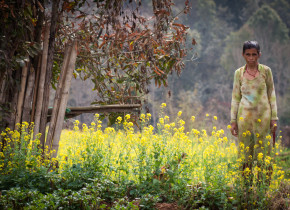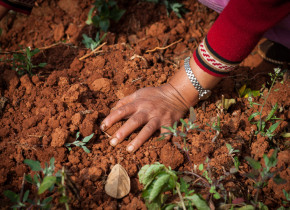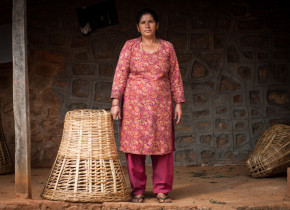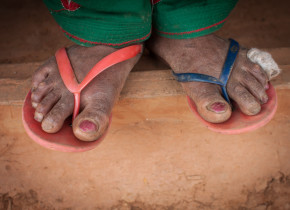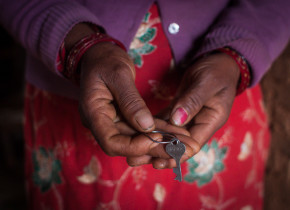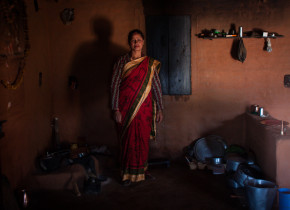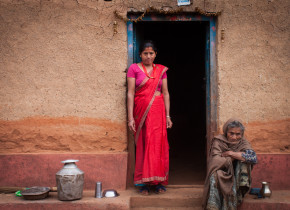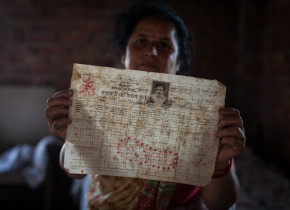I DO NOT OWN IT
The land where our children grew,
Happiness and sorrow passes through.
I love to pour my energy and sweat,
Believe that it’s my karma and my fate.
Ups and downs came in much range,
I own the power to adapt, to change.
But still, equity is missing a bit;
I stand on my land but I don’t own it.
WOMEN’S contributions constitute 55-82 percent of the total agricultural labour in Nepal. However, few women own the land they work on. Women’s land ownership is being promoted through a land registration policy that was enacted in 2006 and amended in 2009. Under the 2009 amendment, 25 percent of the registration taxes for land and property are waived if done in a woman’s name. Yet data from the Central Bureau of Statistics indicate that in 2011, more than 90 percent of women still do not own any land. Though this trend is gradually changing in urban areas, rural women—who, according to research undertaken in Nepal and India by ICIMOD with support from IFAD, spend more time doing agricultural work, cultivating rice, and managing natural resources than men—are yet to benefit from this policy. There may be several reasons behind this; many women are not aware of the policy, and, for some, they do not fully realise the benefits of holding their rights to land ownership.
Click on the photos for slideshow
- Indira Dahal, 35, stands on 10 ropanis (1 Ropani is equal to 508.74 sq m) of land owned by her family. She works hard to manage a small poultry farm on the land which generates income to support her family, yet she does not own any of the land. 6 February, 2013, Kavre.
- Although Saraswati Bhetwal, 46, works on 14 ropanis of land owned by her family—growing potatoes to make an income and sustain her family—all of the land is registered in her husband’s name. 6 February, 2013. Kavre.
- Parbati Adhikari, 41, stands next to a doko she uses for agricultural work on the land her family owns. Twelve ropanis of land are registered in the name of Parbati’s father-in-law. “In the future, this property will be passed on to my husband, not to me,” she says. 6 February, 2013. Kavre.
- The foot print of Koushila Sapkota in her house, Lamdehi, Kavre, 42, her family has got 14 Ropani of land but she does not own any land jointly or in her own name. 6 February, 2013. Kavre.
- Nani Maya Shiva Bhakti, 40 from Kavre district stands on the door of her house. Nani Maya Shivabhakti‘s family has got four Ana of land and a house on it. The land is registered in the name of her husband. She Say “We worked together, saved money and bought this four Ana of Land which is registered on my husband’s Name, I do not own any land or Home”. 6 February, 2013. Kavre.
- Nani Maya Shiva Bhakti, 40 from Kavre district stands on the door of her house. Nani Maya Shivabhakti‘s family has got four Ana of land and a house on it. The land is registered in the name of her husband. She Say “We worked together, saved money and bought this four Ana of Land which is registered on my husband’s Name, I do not own any land or Home”. 6 February, 2013. Kavre.
- Ganga KC—whose family owns seven ropanis of land and a house, none of which she’s inherited—blames traditional social structures and patriarchy for preventing women’s equal inheritance of property. “Property from former generations simply passes to the sons; a daughter or daughter-in-law has to ask for the same property,” she says. However, Ganga is hopeful; she has recently managed to purchase a small piece of land in her own name. 7 February, 2013. Kavre.
- Sangita Sipkhan, 40(standing) and her Mother in law, Lamdehi, Kavre, Sangita’s family has got 6 Ropani of land and a house and does not own any land.
- Nirmala Pokhrel , 49, from Chitwan district shows the land ownership certificates of her family. All the lands in her family are registered on the name of her husband, Yagya Raj Pokhrel. 16 March 2013, Chitwan.
